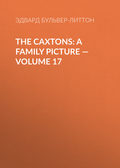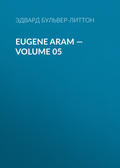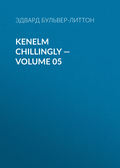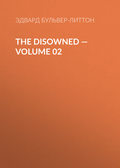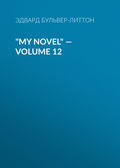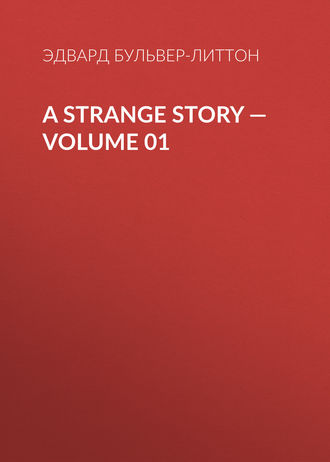
Эдвард Бульвер-Литтон
A Strange Story — Volume 01
Dr. Lloyd, thus taken by the hand, soon extended the range of his visits beyond the Hill, which was not precisely a mountain of gold to doctors, and shared with myself, though in a comparatively small degree, the much more lucrative practice of Low Town.
I had no cause to grudge his success, nor did I. But to my theories of medicine his diagnosis was shallow, and his prescriptions obsolete. When we were summoned to a joint consultation, our views as to the proper course of treatment seldom agreed. Doubtless he thought I ought to have deferred to his seniority in years; but I held the doctrine which youth deems a truth and age a paradox,—namely, that in science the young men are the practical elders, inasmuch as they are schooled in the latest experiences science has gathered up, while their seniors are cramped by the dogmas they were schooled to believe when the world was some decades the younger.
Meanwhile my reputation continued rapidly to advance; it became more than local; my advice was sought even by patients from the metropolis. That ambition, which, conceived in early youth, had decided my career and sweetened all its labours,—the ambition to take a rank and leave a name as one of the great pathologists to whom humanity accords a grateful, if calm, renown,—saw before it a level field and a certain goal.
I know not whether a success far beyond that usually attained at the age I had reached served to increase, but it seemed to myself to justify, the main characteristic of my moral organization,—intellectual pride.
Though mild and gentle to the sufferers under my care, as a necessary element of professional duty, I was intolerant of contradiction from those who belonged to my calling, or even from those who, in general opinion, opposed my favourite theories. I had espoused a school of medical philosophy severely rigid in its inductive logic. My creed was that of stern materialism. I had a contempt for the understanding of men who accepted with credulity what they could not explain by reason. My favourite phrase was "common-sense." At the same time I had no prejudice against bold discovery, and discovery necessitates conjecture, but I dismissed as idle all conjecture that could not be brought to a practical test.
As in medicine I had been the pupil of Broussais, so in metaphysics I was the disciple of Condillac. I believed with that philosopher that "all our knowledge we owe to Nature; that in the beginning we can only instruct ourselves through her lessons; and that the whole art of reasoning consists in continuing as she has compelled us to commence." Keeping natural philosophy apart from the doctrines of revelation, I never assailed the last; but I contended that by the first no accurate reasoner could arrive at the existence of the soul as a third principle of being equally distinct from mind and body. That by a miracle man might live again, was a question of faith and not of understanding. I left faith to religion, and banished it from philosophy. How define with a precision to satisfy the logic of philosophy what was to live again? The body? We know that the body rests in its grave till by the process of decomposition its elemental parts enter into other forms of matter. The mind? But the mind was as clearly the result of the bodily organization as the music of the harpsichord is the result of the instrumental mechanism. The mind shared the decrepitude of the body in extreme old age, and in the full vigour of youth a sudden injury to the brain might forever destroy the intellect of a Plato or a Shakspeare. But the third principle,—the soul,—the something lodged within the body, which yet was to survive it? Where was that soul hidden out of the ken of the anatomist? When philosophers attempted to define it, were they not compelled to confound its nature and its actions with those of the mind? Could they reduce it to the mere moral sense, varying according to education, circumstances, and physical constitution? But even the moral sense in the most virtuous of men may be swept away by a fever. Such at the time I now speak of were the views I held,—views certainly not original nor pleasing; but I cherished them with as fond a tenacity as if they had been consolatory truths of which I was the first discoverer. I was intolerant to those who maintained opposite doctrines,—despised them as irrational, or disliked them as insincere. Certainly if I had fulfilled the career which my ambition predicted,—become the founder of a new school in pathology, and summed up my theories in academical lectures,—I should have added another authority, however feeble, to the sects which circumscribe the interest of man to the life that has its close in his grave.
Possibly that which I have called my intellectual pride was more nourished than I should have been willing to grant by the self-reliance which an unusual degree of physical power is apt to bestow. Nature had blessed me with the thews of an athlete. Among the hardy youths of the Northern Athens I had been preeminently distinguished for feats of activity and strength. My mental labours, and the anxiety which is inseparable from the conscientious responsibilities of the medical profession, kept my health below the par of keen enjoyment, but had in no way diminished my rare muscular force. I walked through the crowd with the firm step and lofty crest of the mailed knight of old, who felt himself, in his casement of iron, a match against numbers. Thus the sense of a robust individuality, strong alike in disciplined reason and animal vigour, habituated to aid others, needing no aid for itself, contributed to render me imperious in will and arrogant in opinion. Nor were such defects injurious to me in my profession; on the contrary, aided as they were by a calm manner, and a presence not without that kind of dignity which is the livery of self-esteem, they served to impose respect and to inspire trust.
CHAPTER II
I had been about six years at L—— when I became suddenly involved in a controversy with Dr. Lloyd. Just as this ill-fated man appeared at the culminating point of his professional fortunes, he had the imprudence to proclaim himself not only an enthusiastic advocate of mesmerism as a curative process, but an ardent believer of the reality of somnambular clairvoyance as an invaluable gift of certain privileged organizations. To these doctrines I sternly opposed myself,—the more sternly, perhaps, because on these doctrines Dr. Lloyd founded an argument for the existence of soul, independent of mind, as of matter, and built thereon a superstructure of physiological fantasies, which, could it be substantiated, would replace every system of metaphysics on which recognized philosophy condescends to dispute.
About two years before he became a disciple rather of Puysegur than Mesmer (for Mesmer hard little faith in that gift of clairvoyance of which Puysegur was, I believe, at least in modern times, the first audacious asserter), Dr. Lloyd had been afflicted with the loss of a wife many years younger than himself, and to whom he had been tenderly attached. And this bereavement, in directing the hopes that consoled him to a world beyond the grave, had served perhaps to render him more credulous of the phenomena in which he greeted additional proofs of purely spiritual existence. Certainly, if, in controverting the notions of another physiologist, I had restricted myself to that fair antagonism which belongs to scientific disputants anxious only for the truth, I should need no apology for sincere conviction and honest argument; but when, with condescending good-nature, as if to a man much younger than himself, who was ignorant of the phenomena which he nevertheless denied, Dr. Lloyd invited me to attend his seances and witness his cures, my amour propre became aroused and nettled, and it seemed to me necessary to put down what I asserted to be too gross an outrage on common-sense to justify the ceremony of examination. I wrote, therefore, a small pamphlet on the subject, in which I exhausted all the weapons that irony can lend to contempt. Dr. Lloyd replied; and as he was no very skilful arguer, his reply injured him perhaps more than my assault. Meanwhile, I had made some inquiries as to the moral character of his favourite clairvoyants. I imagined that I had learned enough to justify me in treating them as flagrant cheats, and himself as their egregious dupe.
Low Town soon ranged itself, with very few exceptions, on my side. The Hill at first seemed disposed to rally round its insulted physician, and to make the dispute a party question, in which the Hill would have been signally worsted, when suddenly the same lady paramount, who had secured to Dr. Lloyd the smile of the Eminence, spoke forth against him, and the Eminence frowned.
"Dr. Lloyd," said the Queen of the Hill, "is an amiable creature, but on this subject decidedly cracked. Cracked poets may be all the better for being cracked,—cracked doctors are dangerous. Besides, in deserting that old-fashioned routine, his adherence to which made his claim to the Hill's approbation, and unsettling the mind of the Hill with wild revolutionary theories, Dr. Lloyd has betrayed the principles on which the Hill itself rests its social foundations. Of those principles Dr. Fenwick has made himself champion; and the Hill is bound to support him. There, the question is settled!"
And it was settled.
From the moment Mrs. Colonel Poyntz thus issued the word of command, Dr. Lloyd was demolished. His practice was gone, as well as his repute. Mortification or anger brought on a stroke of paralysis which, disabling my opponent, put an end to our controversy. An obscure Dr. Jones, who had been the special pupil and protege of Dr. Lloyd, offered himself as a candidate for the Hill's tongues and pulses. The Hill gave him little encouragement. It once more suspended its electoral privileges, and, without insisting on calling me up to it, the Hill quietly called me in whenever its health needed other advice than that of its visiting apothecary. Again it invited me, sometimes to dinner, often to tea; and again Miss Brabazon assured me by a sidelong glance that it was no fault of hers if I were still single.
I had almost forgotten the dispute which had obtained for me so conspicuous a triumph, when one winter's night I was roused from sleep by a summons to attend Dr Lloyd, who, attacked by a second stroke a few hours previously, had, on recovering sense, expressed a vehement desire to consult the rival by whom he had suffered so severely. I dressed myself in haste and hurried to his house.
A February night, sharp and bitter; an iron-gray frost below, a spectral melancholy moon above. I had to ascend the Abbey Hill by a steep, blind lane between high walls. I passed through stately gates, which stood wide open, into the garden ground that surrounded the old Abbots' House. At the end of a short carriage-drive the dark and gloomy building cleared itself from leafless skeleton trees,—the moon resting keen and cold on its abrupt gables and lofty chimney-stacks. An old woman-servant received me at the door, and, without saying a word, led me through a long low hall, and up dreary oak stairs, to a broad landing, at which she paused for a moment, listening. Round and about hall, staircase, and landing were ranged the dead specimens of the savage world which it had been the pride of the naturalist's life to collect. Close where I stood yawned the open jaws of the fell anaconda, its lower coils hidden, as they rested on the floor below, by the winding of the massive stairs. Against the dull wainscot walls were pendent cases stored with grotesque unfamiliar mummies, seen imperfectly by the moon that shot through the window-panes, and the candle in the old woman's hand. And as now she turned towards me, nodding her signal to follow, and went on up the shadowy passage, rows of gigantic birds—ibis and vulture, and huge sea glaucus—glared at me in the false light of their hungry eyes.
So I entered the sick-room, and the first glance told me that my art was powerless there.
The children of the stricken widower were grouped round his bed, the eldest apparently about fifteen, the youngest four; one little girl—the only female child—was clinging to her father's neck, her face pressed to his bosom, and in that room her sobs alone were loud.
As I passed the threshold, Dr. Lloyd lifted his face, which had been bent over the weeping child, and gazed on me with an aspect of strange glee, which I failed to interpret. Then as I stole towards him softly and slowly, he pressed his lips on the long fair tresses that streamed wild over his breast, motioned to a nurse who stood beside his pillow to take the child away, and in a voice clearer than I could have expected in one on whose brow lay the unmistakable hand of death, he bade the nurse and the children quit the room. All went sorrowfully, but silently, save the little girl, who, borne off in the nurse's arms, continued to sob as if her heart were breaking.
I was not prepared for a scene so affecting; it moved me to the quick. My eyes wistfully followed the children so soon to be orphans, as one after one went out into the dark chill shadow, and amidst the bloodless forms of the dumb brute nature, ranged in grisly vista beyond the death-room of man. And when the last infant shape had vanished, and the door closed with a jarring click, my sight wandered loiteringly around the chamber before I could bring myself to fix it on the broken form, beside which I now stood in all that glorious vigour of frame which had fostered the pride of my mind. In the moment consumed by my mournful survey, the whole aspect of the place impressed itself ineffaceably on lifelong remembrance. Through the high, deepsunken casement, across which the thin, faded curtain was but half drawn, the moonlight rushed, and then settled on the floor in one shroud of white glimmer, lost under the gloom of the death-bed. The roof was low, and seemed lower still by heavy intersecting beams, which I might have touched with my lifted hand. And the tall guttering candle by the bedside, and the flicker from the fire struggling out through the fuel but newly heaped on it, threw their reflection on the ceiling just over my head in a reek of quivering blackness, like an angry cloud.
Suddenly I felt my arm grasped; with his left hand (the right side was already lifeless) the dying man drew me towards him nearer and nearer, till his lips almost touched my ear, and, in a voice now firm, now splitting into gasp and hiss, thus he said, "I have summoned you to gaze on your own work! You have stricken down my life at the moment when it was most needed by my children, and most serviceable to mankind. Had I lived a few years longer, my children would have entered on manhood, safe from the temptations of want and undejected by the charity of strangers. Thanks to you, they will be penniless orphans. Fellow-creatures afflicted by maladies your pharmacopoeia had failed to reach came to me for relief, and they found it. 'The effect of imagination,' you say. What matters, if I directed the imagination to cure? Now you have mocked the unhappy ones out of their last chance of life. They will suffer and perish. Did you believe me in error? Still you knew that my object was research into truth. You employed against your brother in art venomous drugs and a poisoned probe. Look at me! Are you satisfied with your work?"
I sought to draw back and pluck my arm from the dying man's grasp. I could not do so without using a force that would have been inhuman. His lips drew nearer still to my ear.
"Vain pretender, do not boast that you brought a genius for epigram to the service of science. Science is lenient to all who offer experiment as the test of conjecture. You are of the stuff of which inquisitors are made. You cry that truth is profaned when your dogmas are questioned. In your shallow presumption you have meted the dominions of nature, and where your eye halts its vision, you say, 'There nature must close;' in the bigotry which adds crime to presumption, you would stone the discoverer who, in annexing new realms to her chart, unsettles your arbitrary landmarks. Verily, retribution shall await you! In those spaces which your sight has disdained to explore you shall yourself be a lost and bewildered straggler. Hist! I see them already! The gibbering phantoms are gathering round you!"
The man's voice stopped abruptly; his eye fixed in a glazing stare; his hand relaxed its hold; he fell back on his pillow. I stole from the room; on the landing-place I met the nurse and the old woman-servant. Happily the children were not there. But I heard the wail of the female child from some room not far distant.
I whispered hurriedly to the nurse, "All is over!" passed again under the jaws of the vast anaconda, and on through the blind lane between the dead walls, on through the ghastly streets, under the ghastly moon, went back to my solitary home.



